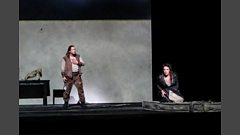
Wagner's Ring Cycle: Siegfried
Siegfried, the third of the four operas of Wagner's Ring cycle, from the Royal Opera House, Covent Garden in 2018, with Stefan Vinke as Siegfried and conducted by Antonio Pappano.
Continuing the broadcasts of Wagner's Ring cycle from 2018 from the Royal Opera House, Covent Garden, this evening: Siegfried.
As Wagner's epic drama reaches its third part, an embittered dwarf covets a ring guarded by a dragon killed by the heroic Siegfried who encounters a woman (his aunt, Brünnhilde) and for the first time is afraid and then in love.
The Orchestra of the Royal Opera House and a stellar cast led by Stefan Vinke in the title role is conducted by Antonio Pappano in Keith Warner's acclaimed production. Presented by Tom Service.
5.00pm
Antonio Pappano gives a brief illustrated listening guide to Siegfried.
Act 1
6.25pm
Interval
Dread, hydration, sweat, good digestion and an incredible feeling of elation: Stefan Vinke, veteran of over 100 performances of Siegfried, on the challenges and rewards of singing one of the most demanding tenor roles of the repertoire.
6.35pm
Act 2
7.50pm
Interval
ROH Orchestra principal horn Roger Montgomery explains the workings and role of the Wagner tuba in The Ring. And Michael Portillo reflects on The Ring, its place in his life and its depiction of power and love.
8.10pm
Act 3
Siegfried ..... Stefan Vinke (tenor)
Brünnhilde ..... Nina Stemme (soprano)
Mime ..... Gerhard Siegel (tenor)
Wanderer ..... John Lundgren (baritone)
Alberich ..... Johannes Martin Kränzle (baritone)
Fafner ..... Brindley Sherratt (bass)
Erda ..... Wiebke Lehmkuhl (contralto)
Woodbird ..... Heather Engebretson (soprano)
Royal Opera House Orchestra
Antonio Pappano (Conductor)
Last on
![]()
"Put down everything and immerse yourself!"
Everything you need to know to enjoy listening to Wagner's Ring on Radio 3.
Music Played
-
![]()
Richard Wagner
Siegfried Act I
Performer: Orchestra of the Royal Opera House, Covent Garden. Singer: Stefan Vinke. Singer: Nina Stemme. Singer: Gerhard Siegel. Singer: John Lundgren. Singer: Johannes Martin Kränzle. Singer: Brindley Sherratt. Conductor: Sir Antonio Pappano. -
![]()
Richard Wagner
Siegfried Act II
Performer: Orchestra of the Royal Opera House, Covent Garden. Singer: Stefan Vinke. Singer: Nina Stemme. Singer: Gerhard Siegel. Singer: John Lundgren. Singer: Johannes Martin Kränzle. Singer: Brindley Sherratt. Conductor: Sir Antonio Pappano. -
![]()
Richard Wagner
Siegfried Act III
Performer: Orchestra of the Royal Opera House, Covent Garden. Singer: Stefan Vinke. Singer: Nina Stemme. Singer: Gerhard Siegel. Singer: John Lundgren. Singer: Johannes Martin Kränzle. Singer: Brindley Sherratt. Conductor: Sir Antonio Pappano. -
![]()
Antonín Dvořák
Serenade for Wind
Orchestra: Academy of St Martin in the Fields. Conductor: Neville Marriner.- Philips.
Synopsis
Mime cannot forge Nothung, Siegmund’s sword which Wotan broke long ago. With this sword Siegfried could kill the dragon Fafner, who guards the Nibelung hoard with the all-powerful ring and magic Tarnhelm. Mime’s aim in raising the boy has been to gain the ring. He can only wait, impotent, trapped in a stalemate, not realizing that ‘only he who never felt fear can fashion Nothung now’.
��
Act I
Mime has spent years of thankless toil trying to make a sword for Siegfried. Siegfried returns home with a bear that terrifies Mime. Mime offers Siegfried his latest sword, which breaks as easily as the others had done. Siegfried attacks Mime for his incompetence, but Mime reminds the boy of the care he has lavished on him over the years. Siegfried responds that, though Mime has taught him many things, he has not taught him to like him. Mime’s insistence that he is both his father and mother enrages Siegfried, who demands to know who his true parents were. Mime cautiously reveals how he found Sieglinde dying in childbirth and claims that she entrusted her infant, Siegfried, into his care. When asked for proof he produces the fragments of Nothung, once wielded by Siegfried’s father. Revelling in his ��release from any bond to Mime, Siegfried demands that Nothung be reforged so that he may go out into the world.
��
Wotan appears in disguise as the Wanderer and offers wisdom in exchange for hospitality. He suggests to the unwilling Mime that they play a game of riddles, the stake being their heads. The Wanderer answers Mime’s questions about the dwarfs, giants and gods in great detail. Challenged in turn, Mime proves that he knows of Siegfried’s relationship to Wotan (he is his grandson), and that Siegfried is destined to kill Fafner with Nothung, but he cannot say who will forge the sword. The Wanderer tells the desperate Mime that ‘only he who never felt fear can fashion Nothung now’, and that Mime shall also forfeit his head, thus teaching him that he cannot be the one to accomplish the task. Siegfried returns to find Mime in a state of terror. Seeking a way out of his dilemma, Mime attempts to teach the boy what it feels like to be afraid. Siegfried finds the idea tantalizing and is eager to learn fear from encountering Fafner. When Mime confesses that he cannot forge Nothung, Siegfried takes on the task himself. Amazed by Siegfried’s methods, Mime is delighted to see that the boy will succeed, but to save himself he brews a drugged drink to offer Siegfried after his fight with the dragon. He will then kill Siegfried and seize the ring.
��
Act II
Alberich keeps watch outside Fafner’s cave, waiting for an opportunity to regain the ring. When the Wanderer appears, Alberich recognizes him as Wotan and attacks him as a thief. Wotan claims he is no longer interested in the ring and warns Alberich of Mime’s intentions. Playing on Alberich’s desire and fear, Wotan suggests that Alberich pass on the warning. He wakes Fafner, who is not troubled. Alberich swears that he will regain the ring and bring about the downfall of the gods. Mime and Siegfried arrive at the cave. Mime’s dread only provokes curiosity in Siegfried, who is confident of his ability to defeat Fafner. Left on his own to wait, Siegfried contemplates his origins and his loneliness and begins to understand his being in terms of what confronts him in nature. He tries to communicate with the birds, first with a pipe and then with his horn, which wakes Fafner. Siegfried kills Fafner but does not understand his warning about the ring’s curse. When Siegfried withdraws his sword he is burnt by the dragon’s blood, which he tastes. He now understands the Woodbird who tells him to seek the ring and the Tarnhelm in the cave.
��
While Siegfried is in the cave, Mime and Alberich bicker. Siegfried returns and the Woodbird tells him that he will now understand Mime’s murderous plans. As he becomes aware of Mime’s intention to kill him, Siegfried kills him first, as the Wanderer predicted. No happier for all the new complexity he has learnt, the boy asks the Woodbird for more advice: how can he find a companion? The bird tells him of the wonderful woman who sleeps on a rock surrounded by fire. Siegfried sets off in wild excitement to find Brünnhilde.
��
Act III
Wotan wakes Erda, hoping her knowledge will provide him with some self-justification. She is unresponsive and tells him to seek answers from the Norns or from their own daughter, Brünnhilde. When Wotan reveals how he punished Brünnhilde for disobedience, Erda accuses him of hypocrisy. Wotan sees she has nothing to offer him and dismisses her. He now claims that he desires the end of the gods. He believes that Siegfried and Brünnhilde, glorying in love, will redeem the world from the curse of the ring. Wotan prepares to meet Siegfried for the first time, as the Wanderer. Siegfried becomes irritated with the older man’s questions. Provoked, the Wanderer alludes to his true relationship to Siegfried, hints at his power and bars his way. When Siegfried smashes Wotan’s spear, Wotan has to accept that his power is at an end. Siegfried discovers Brünnhilde. He removes her armour and, seeing a female form, is afraid for the first time in his life. Calling on his mother for courage, he kisses Brünnhilde and wakes her. Brünnhilde avoids responding to his passion. Confused, Siegfried briefly takes her to be his mother. While she tries to explain her spiritual love and his duty to the world, his fervour increases. Siegfried’s persistence and passion ultimately conquer Brünnhilde. Full of ardour, she calls for the destruction of Valhalla and the twilight of the gods. Nothing will daunt their absolute love, not even the end of the world.
Broadcasts
- Sat 17 Nov 2018 17:00����ý Radio 3
- Fri 19 Feb 2021 17:00����ý Radio 3



